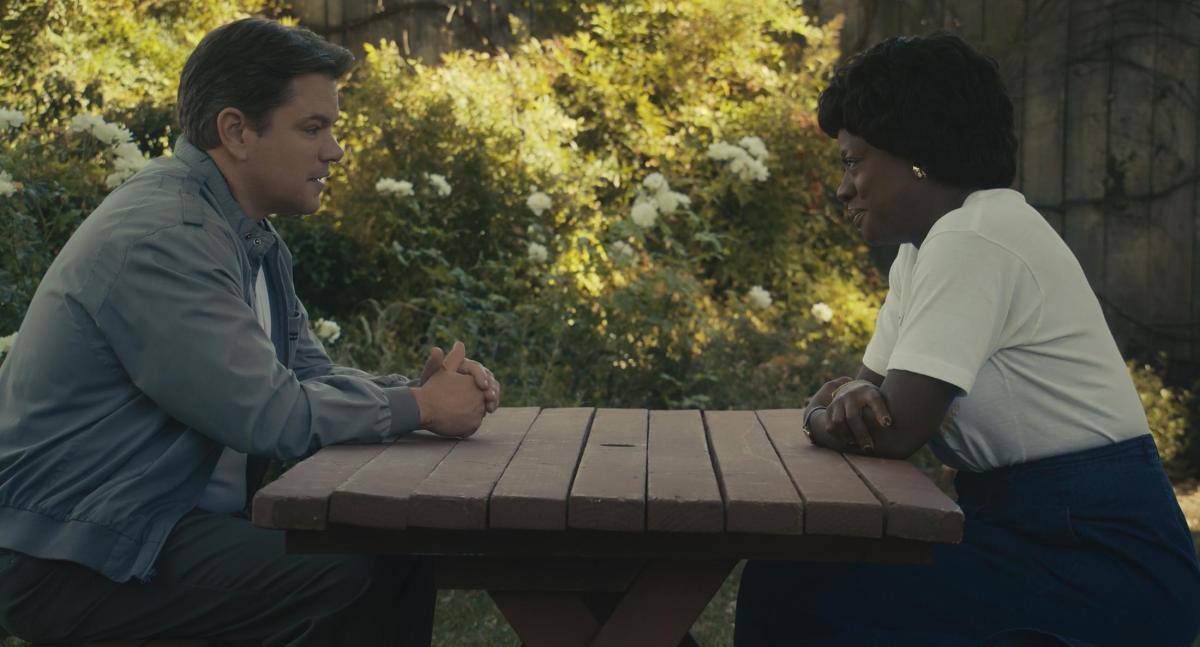
It’s hard to believe that a film about Nike—Nike!—could play like a scrappy little underdog story, yet such is the case with Air. But first, we have to get into the time machine and travel all the way back to 1984.
At the time, Nike was known for one thing: their running shoes. Just skinny white people pounding the pavement in short shorts and Nylon sneakers, as the jogging craze was sweeping the nation.
They weren’t the brand associated with basketball—that was Converse.
And they weren’t the band associated with cool—that was Adidas, who soared to new heights of popularity after Run D.M.C. made the Adidas tracksuit and three-striped sneaks their uniform. (“All Day I Dream About Sex,” a classmate told me Adidas stood for. Sweet!)
Nike’s basketball division, such as it was, was getting scraps—the lower rungs of the first-round draft picks.
So Air, directed by Ben Affleck—a pretty good actor and a very good director, in my estimation—is about how Nike became, well Nike. It started with Sonny Vaccaro (Affleck bestie Matt Damon), Nike’s hoops-obsessed, pot-bellied head of basketball scouting. Early in the film, Sonny attends a meeting where he listens to the suits propose which players the company could reasonably sign from this year’s draft class. The best options are John Stockton and Charles Barkley, but even they are long shots.
Then Sonny watches some game tape of the University of North Carolina’s championship win over Georgetown. It’s not only that Michael Jordan, then just a freshman, hits the game-winning shot—that’s old news. It’s that the play has clearly been drawn up for him—this, despite the presence of All-American forward James Worthy on the team. And beyond that, it’s Jordan’s composure, his calm, his complete confidence that he’s going to drain the shot, that wows Sonny. This was the guy. A guy that could make an entire basketball division.
Sonny thinks Nike should roll the dice and go all in on Jordan. Sign no one else. Go into the Michael Jordan business.
But there are people to convince: For one, Nike’s owner, the New Age-y, aphorism-spewing Phil Knight (Affleck), a self-styled guru who drives a purple Porsche. Knight may’ve been a dreamer once before, back when he was selling sneakers out of the back of his truck, but now he has a board of directors he’s beholden to. And Sonny, who likes to gamble in his spare time, has had hunches before that didn’t pan out.
This one is different, Sonny assures him. This one is as close to a sure thing as it gets.
Then there’s Jordan’s agent, David Falk, played with spittle-and-profanity flying gusto by Chris Messina. He thinks Nike is trash and that no self-respecting agent would let his client sign with the brand—and he isn’t afraid to let Sonny know it, in the most colorful language imaginable. (“I will chew your nut sack!” he screams—and this is one of his more family friendly insults.) Falk is a pit bull who doesn’t care if the world hates him—as long as he makes bushels and bushels of cash for himself and his clients.
Then there’s Jordan’s mother, Deloris (Viola Davis). Sonny has been told it’s bad form to go behind the agent’s back, but he’s also been told by Nike’s director of player relations (Chris Tucker) that the mother almost always has the final say on these matters. This is confirmed when Sonny goes rogue and drives to the Jordans’ home in North Carolina. He meets Jordan’s dad, the affable James (Davis’ real-life husband, Julius Tennon), who is tinkering on the car in the driveway. “Deloris,” James shouts. “There’s someone here to see you.”
Deloris takes Sonny out back and you can see that she is instantly drawn to his straight-shooting ways. This scene is clever, if a bit overwritten (the screenplay is, shall we say, Sorkin adjacent). Sonny tells Deloris exactly what he expects will go down at the shoe brand pitch meetings. Converse will boast about its A-list talent, like Magic Johnson and Larry Bird, without necessarily understanding Michael’s unique appeal. Adidas will inadvertently expose the company’s disarray in the wake of the death of its founder. (Of course, both these scenarios play out exactly as Sonny describes.)
But what can Nike give the Jordans? An entire basketball department devoted to him. A shoe less about the shoe itself and more about the man who wears the shoe.
Both Davis and Damon are great in these parts. Damon brings a tenacious everyman quality to his role and Davis is every inch the protective mama bear who can spot bullshit from a mile away.
The film also provides a great part for Jason Bateman, as a put-upon Nike basketball exec who could lose his job if Sonny doesn’t sign Jordan. Unlike Sonny, who lives, eats, and breathes basketball, Bateman’s Rob Strasser has a life—divorce payments, a daughter to take care of. The stakes are high for both men, in different ways, and they have a banter-filled friendship that also provides some of the film’s emotional heft.
Air chose not to cast a young man to play Michael Jordan, which mostly makes sense: For one, the film isn’t about him, it’s very much about Sonny and Deloris. Also, Jordan is such a familiar figure that any actor who doesn’t look exactly like him might distract us. But not having him in the film (we often see his back, or his hand extended for a shake) is distracting in its own way.
Bottom line: Air is shrewd and satisfying, just good old-fashioned movie for grown-ups. We learn some things about Nike we never knew (the origins of “Just Do It” blew my mind). We get a glimpse at the how the original Air Jordan was conceived (it involved breaking some NBA rules). And we find ourselves rooting for a multi-billion-dollar corporation like it’s a frickin’ Rocky story. Ah, the power of cinema.
